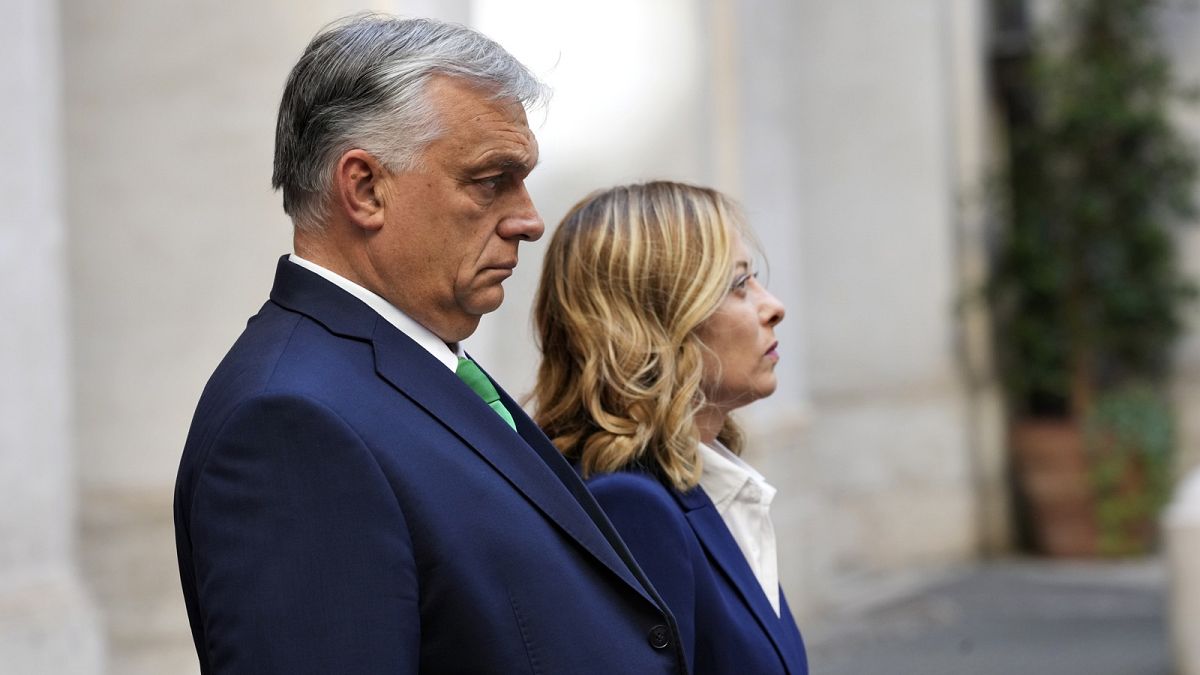The European Commission has released the new edition of its Rule of Law Report, showing persistent problems in press freedom.
Italy, Hungary and Slovakia have come under fire over their continued decline in democratic standards, which threatens the effective prosecution of corruption, the independence of the judicial system and the safety of journalists.
The three countries fared badly in the new edition of the Rule of Law report, released every year by the European Commission. The extensive report examines all member states and offers tailored recommendations to address deficiencies and close loopholes.
"Protecting the rule of law is a continuous work," Vera Jourová, the Commission's vice-president for values and transparency, said on Wednesday while presenting the main findings. "We see that further action is still needed."
The report is "neither naming or shaming, nor praising anyone," she added, calling it a "preventive tool" to foster dialogue and raise awareness.
Still, the exercise inevitably creates a magnified lens over certain countries suspected of drifting away from EU norms.
This year, Italy is urged to do more to ensure the proper funding of public media, protect the professional secrecy of journalists and reform its defamation regime.
The call comes amid concerns in Italy over the growing political influence in the media sector, alleged episodes of censorship, the harassment of critical voices and the potential acquisition of the AGI news agency by a far-right legislator. In May, reporters at RAI, the public broadcaster, went on strike to protest what they described as the "suffocating control" exerted by Giorgia Meloni's government over editorial content.
Meloni has filed legal cases against several reporters who have made scathing remarks about her. Last week, a journalist was ordered to pay €5,000 in damages for mocking the prime minister's height on social media.
"We have been expressing the need for (journalistic) safeguards for years now," Jourová said when asked about Italy. "But with new incidents reported by stakeholders and budget cuts, this is becoming very urgent."
Hungary, a 'systematic' issue
Regarding Hungary, a perennial thorn in the Commission's side, the report shows a total lack of progress in several areas, including rules on lobbying and revolving doors, the prosecution of high-level corruption cases, transparency in state advertising, editorial independence of public media and obstacles that hinder the work of NGOs.
Over the past years, Brussels has launched many infringement procedures against Budapest, most recently over the so-called "Sovereignty Protection Office," empowered to probe people and organisations that receive foreign funding and are suspected of influencing the country's political debate and electoral processes.
The controversial office has begun proceedings into Transparency International and Átlátszó, an investigative nonprofit supported by international donations.
In reaction to the persistent trend of democratic backsliding, the Commission froze more than €30 billion in Hungary's allocated share of cohesion and recovery funds, a situation that Prime Minister Viktor Orbán repeatedly decried as "financial blackmail."
Last year, though, the executive released €10.2 billion after Budapest introduced a judicial reform in line with EU recommendations. The decision triggered a furious backlash and led the European Parliament to sue the Commission.
Roughly €22 billion remain paralysed, with no prospect of a forthcoming solution.
"We try to be fair in the way we analyse the situation," said Didier Reynders, the European Commissioner for Justice, speaking next to Jourová. "But I would say Hungary is a real systemic issue for the Commission about the rule of law."
Uncertainty over Slovakia
A similar outcome might soon befall Slovakia.
Slovakia has for months been under the microscope over a series of legislative changes spearheaded by the government of Prime Minister Robert Fico, putting Brussels on high alert. Chief among them is an overhaul of the public broadcast, RTVS, which this month was disbanded and replaced with a new entity, known as SVTR.
According to Fico, the reform was needed to address the political bias of RTVS, which he described as being "in conflict with the Slovak government." These claims were contested by the organisation and triggered "Black Thursday" protests.
Following criticism, including by the Commission, the government dropped the most contentious parts of the overhaul, such as a council to supervise programming, but kept a provision to allow the ruling majority to control SVTR's governing board.
Brussels is also concerned about proposed changes to the Criminal Code and the dissolution of the Special Prosecutor's Office, which could imperil investigations into the misuse of public money and undermine the EU budget. Additional worries surround a draft law that would require NGOs that receive more than €5,000 from abroad to be labeled as "organisations with foreign support."
Jourová, who voiced preoccupation during a visit to Bratislava in April, said discussions with Fico's government were ongoing and "intense," pending the final version of the legislative pieces. The Commission, she said, has a "duty" to launch infringement procedures if any of these laws eventually violate EU standards.
But will Brussels dare to freeze funds, as it did with Hungary?
"We will go as far as possible in such a political dialogue to solve the issue and to be sure that we have a real protection (about) EU money," said Reynders.
"At the end, we will see if it's possible to agree on the different amendments to consider that we have a real protection or to use other tools," he went on. "But for the moment, we try to give priority to dialogue."












